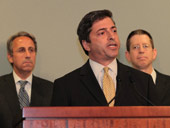Editor's Note: This story came to us via Fox Business Network who regularly notify us of stories Charlie Gasparino does on the FBN. This particular story came in just ahead of the Breaking News - Goldman is going to settle with the SEC - published below in our Daily Links. The relevance of this is the comment made by Goldman's COO - Gary Cohn - that "he would leave if he could". The comment further states that among the reasons for his not leaving is the "myriad" of issues facing them including the SEC case.
What will be interesting to see is if once the SEC case is settled and behind them (a settlement was expected from the very beginning by this reporter) Gary Cohn does indeed leave Goldman. His departure along with the "myriad" of other executives, I wrote about previously, continues to verify what Charlie previously also reported - the mood at Goldman is horrendous.
There is a shake up going on internally as the "fat cats" are deserting what could very well be a sinking ship. You know the old saying, "God works in mysterious ways". Lloyd Blankfein's attempt at doing God's work may just have backfired. God may just be more particular of who is delegated to do his work. But then again, "Lord" Lloyd Blankfein might just believe he is god in which case his disciples (employees) have come to their moment of reality - realizing he is not only mortal but immoral as well.
Below, with permission of Charlie Gasparino and Fox Business Network is the complete story.
Click here to view the original.
Thursday, July 15, 2010
Goldman COO: Would Leave If I Could
By Charlie Gasparino
FOXBusiness
As Goldman Sachs (GS: 145.22, 6.15, 4.42%) continues to seek a settlement with federal securities over probes into its business practice, people inside the company are bracing a significant change in senior management that goes beyond the possibility of CEO Lloyd Blankfein losing his job, FOX Business has learned.
Gary Cohn, the firm’s president and presumed heir apparent to Blankfein, should he step down, has told people on Wall Street that if he could he would leave the troubled Wall Street firm as well, according to people with knowledge of the matter. Cohn, however, is also telling people he isn’t going anywhere until Goldman is finished dealing with the myriad of regulatory bodies investigating the firm’s business practices, including a high-profile case recently filed by the Securities and Exchange Commission charging the firm with civil fraud over its sale of a controversial mortgage-related bond in 2007. Goldman has denied the charges.
Goldman spokesman Lucas van Praag said in a statement that “Gary has no plans on leaving the firm,” adding that “Blankfein and Cohn aren’t going anywhere.”
But people who know Cohn say while his departure isn’t imminent, he clearly would like to leave amid the near endless negative publicity hitting a firm once known as Wall Street’s elite investment bank. Cohn recently gave testimony to the Financial Services Inquiry Committee where he and several Goldman executives were grilled about the firm’s business practices and whether they contributed to the 2008 financial meltdown.
“Gary is like a lot of top guys at Goldman who would leave tomorrow if he could to start a hedge fund,” said one person with direct knowledge of the matter. “He’s pretty unhappy. But until the dust settles, he knows he has to stick around.”
Cohn became president of Goldman and Blankfein’s No. 2 executive in 2006, during a power struggle that saw the duo of former commodities traders take the reign of the big Wall Street investment bank. Blankfein and Cohn brought enormous profits to Goldman and a sharp run up in the company’s stock price by redirecting the firm’s business model away from corporate finance and advising on mergers and acquisitions toward taking risk in esoteric securities.
While the move brought -- and still brings -- enormous profits to Goldman and its shareholders, it also brought the firm a lot of controversy. Goldman, like the rest of Wall Street, benefited from a series of government bailouts during the financial crisis.
Meanwhile, the firm’s trading business has come under fire from regulators who claim that Goldman, in trading these securities, added to the instability of the markets in 2007 and 2008, and took advantage of large clients to make money, both of which Goldman denies.
Cohn, according to people with knowledge of the matter, has all but conceded privately that if Blankfein steps down—a possible condition of any settlement with the SEC -- he won’t become the next CEO. Blankfein, of course, may remain as CEO, but he may be forced to give up his job as chairman as part of a deal with regulators, people inside Goldman say, to someone from the investment -banking side of the business, which hasn't been the focus of scrutiny. Either way, that move will erode Cohn’s power inside the firm and could force him to leave.






